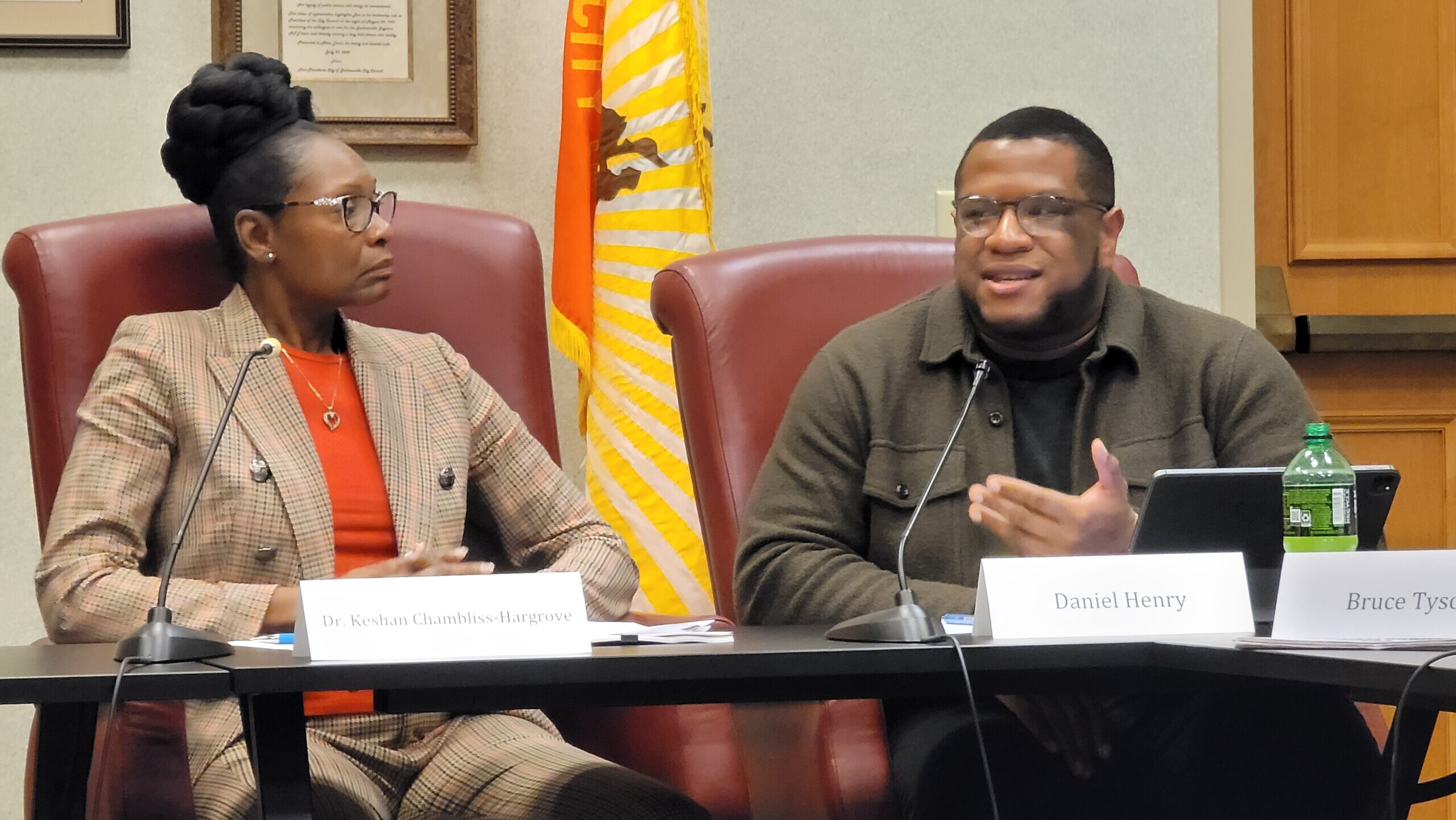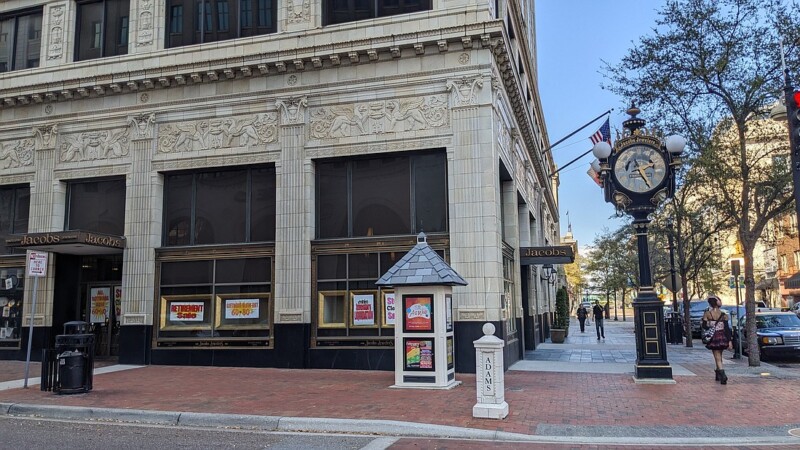As Jacksonville negotiates what could be its biggest contract ever, a watchdog committee says the city is mismanaging its contracts and risking taxpayer dollars.
Among the board’s concerns:
- The company in charge of finances for the stadium and other performance venues is set to be nearly $3 million over budget without written authority to do so
- City land donated for affordable housing may not always end up used for that purpose
“All of us are kind of disturbed by the mismanagement of funding, and we want to do our part (in) researching and sending a strong recommendation to the City Council president as well as the mayor’s office,” TRUE Commission Chair Keshan Chambliss said at a meeting in February.
Commission members say the city sometimes fails to ensure all contract requirements are strictly adhered to. Having discussed these concerns among themselves for several months, the TRUE Commission is inviting the city’s inspector general to provide a report on previous investigations into contracts governing the management of event venues and the donation of surplus property.
Commissioners want to know how to help the city tackle what they view as repeated shortcomings in enforcing contracts.
Tony Zebouni is the chair of a subcommittee created to look into the city’s contract with ASM Global, the company contracted to manage the stadium and several other city-owned facilities, like VyStar Veterans Memorial Arena and the Jacksonville Performing Arts Center. Zebouni, an attorney who formerly worked in the city’s Office of General Council, told his colleagues that challenges the commission encountered with SMG, an ASM Global predecessor, appear to be popping back up.
“I’ve spoken to representatives of the inspector general,” Zebouni said at a TRUE Commission meeting last week. “I believe that you agreed to invite the inspector general and see what they’re doing, and what changes are being done on the side of the city for management of those contracts. And a lot of those answers will be at the next meeting.”
That meeting is set for May 9.
What is the TRUE Commission?
The commission – officially titled the Taxation, Revenue and Utilization of Expenditures Commission – was created to keep an eye on the city’s bottom dollar back in 1994. It can inspect any aspect of the city’s fiscal policy. That means looking at revenue, expenses, contracts, pensions or debt management — its range is vast.
The board is supposed to total 18 members, but it currently has nine. They represent four of the area’s six citizen planning advisory committees, or CPACs, as well as five members appointed by the council president. The nine vacancies include one representative each from the Greater Arlington/Beaches CPAC and North CPAC, one remaining appointment by the City Council president and all six mayoral appointments.
Among several contract issues the TRUE Commission has flagged is that EverBank Stadium manager ASM Global is projected to go over budget this year by more than $2.9 million, according to a council auditor’s quarterly report. ASM’s contract allows for overspending with the mayor’s approval — but the administration never gave permission in writing, according to the auditor.
TRUE commissioners want to understand how that happened, so they created the subcommittee to probe that issue in February. At its first meeting in March, a representative from the council auditor’s office said an increase in the number of events had led to the higher costs and that they could be balanced out by higher revenues the rest of the year. But the council auditor’s office also stressed how difficult it is to keep an eye on the numbers when it comes to the ASM Global contract.
“It’s been a tricky contract for compliance,” Heather Reber, principal auditor with the council auditor’s office, told the commission. “It’s been administered by the mayor’s office. It’s been administered by the sports entertainment office. It’s just been passed around based on who’s in the administration or who’s at the sports and entertainment office. … So it’s kind of hard to know who is actually in charge of compliance.”
Reber said the city and ASM Global were in talks to fix the issues, though “nothing is set in stone.”
She also said she hopes the process will improve under a reorganization proposed by Mayor Donna Deegan, which would remove the sports and entertainment division and its director, Alex Alston, from the Parks, Recreation and Community Services Department and make it a separate department.
The legislation began moving through the City Council process, but the Rules and Finance committees both delayed action on it last week at the request of Council President Ron Salem.
ASM Global and the council president had not responded to multiple requests for comment as of this story’s publication time.
In an email, the mayor’s Chief Communications Officer Phil Perry said, “for the past decade or more, ASM’s overall revenue from events has always exceeded expenses each year —whether the expenses were budgeted or were from bringing in new events.”
Perry said the Office of General Counsel is comfortable with the management contract language, and the city is kept in the loop on spending through ASM’s monthly financial statements and a quarterly reports.
“In the interest of even greater transparency, they have agreed to clearly list out new expenses with each quarterly report so that the CFO and sports & entertainment director can review and approve,” Perry said.
Property donation program
Last September, the Inspector General’s Office released a report about a surplus property donation program that aims to give local nonprofit agencies first crack at acquiring land from the city for free in return for creating more affordable housing in the city.
The inspector general’s report found that, in some cases, years after the properties had been donated, they were not being used for the intended purpose. And the city was not executing a clause in the contract to take back control of the properties.
The City Council — at the same time as the inspector general’s report was released — also filed several pieces of legislation to try to improve the program and shore up those issues.
The Neighborhoods Department, in response to the report, said fixing the program through legislation was vital, but legally taking back the property could be complicated and expensive.
The department instead suggested allowing more time for the nonprofits to build affordable housing, as well as allowing them to purchase the property from the city if plans to build housing fell through.
“The need to update the ordinance code is critical for several reasons,” wrote Chiquita Moore, acting neighborhoods operations director. She went on to say that the only option the city had was to sue each individual property owner, which she said is “very time consuming, expensive, and a drain of city resources.”
The legislation to fix the program passed, but at least one TRUE Commission member doesn’t find those solutions ideal.
Commissioner Kim Pryor, who represents the Urban Core CPAC, has been the most vocal critic of the property donation program.
“They get this property for free,” Pryor said. “They renege on their agreement. It’s supposed to be for affordable housing. They sell them, do nothing. And now… almost five years later, then they’re going to be allowed to buy the property for assessed value, which we all know is less than market rate. I have a huge problem with that.”
Perry, the mayor’s communications director, said in a phone call Wednesday that if the inspector general provides any new or updated recommendations, the city will make sure it is in “alignment” with them.
What comes next
The increased scrutiny on contract compliance comes amid one of the biggest deals in city history. In a little over a month, the Jacksonville Jaguars and the city are expected to release tentative terms to build the estimated $1.4 billion “Stadium of the Future” as part of a new lease agreement with the team. The City Council expects to hear about it from the city’s chief negotiator, Mike Weinstein, on May 14, as Weinstein told Jacksonville Today news partner News4Jax.
The mayor’s administration has said there will be “community input sessions” on the plan.
“There are many, many pieces. There’s parking, there’s security, there’s finances, there’s construction schedule. There’s many, many pieces to it besides just what the obligation will be to the Jaguars and what the obligation will be to the city,” Weinstein said, adding that other factors include maintenance, capital improvements and surcharges for 30 years, which all have to be resolved and agreed to as part of the same package.
“So until everything is agreed to, nothing is agreed to,” Weinstein said.
While the TRUE Commission has not yet asked Inspector General Matt Lascell to open a new investigation, the board said last week it wants to hear from his office.
The Inspector General’s Office is expected to give an update on both the outcome of its investigation into surplus property donations as well as an update on an earlier probe into SMG, the event facility management firm that became ASM Global after a merger.
According to the inspector general’s office, it was not looking into the contract with ASM Global as of Friday, but the TRUE Commission is within its right to ask for a review of the issue.
Commissioners say they want to do their part to advise the city on dotting the i’s and crossing the t’s.
“I’m seeing a pattern here… within the city government, in that they do things without getting approval, when they should,” Pryor said. “This happens a lot in that they don’t follow proper procedure, and the auditors go in and they find these problems or these deviations from procedures or contracts and so forth, and they bring it to light. Yet it seems that nothing is ever done.”
Corrected on 4/11/24: This story originally said Mayor Donna Deegan’s proposed reorganization would create a director of sports and entertainment. In fact that position exists but would move into a newly created department.

Casmira Harrison is a Jacksonville Today reporter focusing on local government in Duval County.






